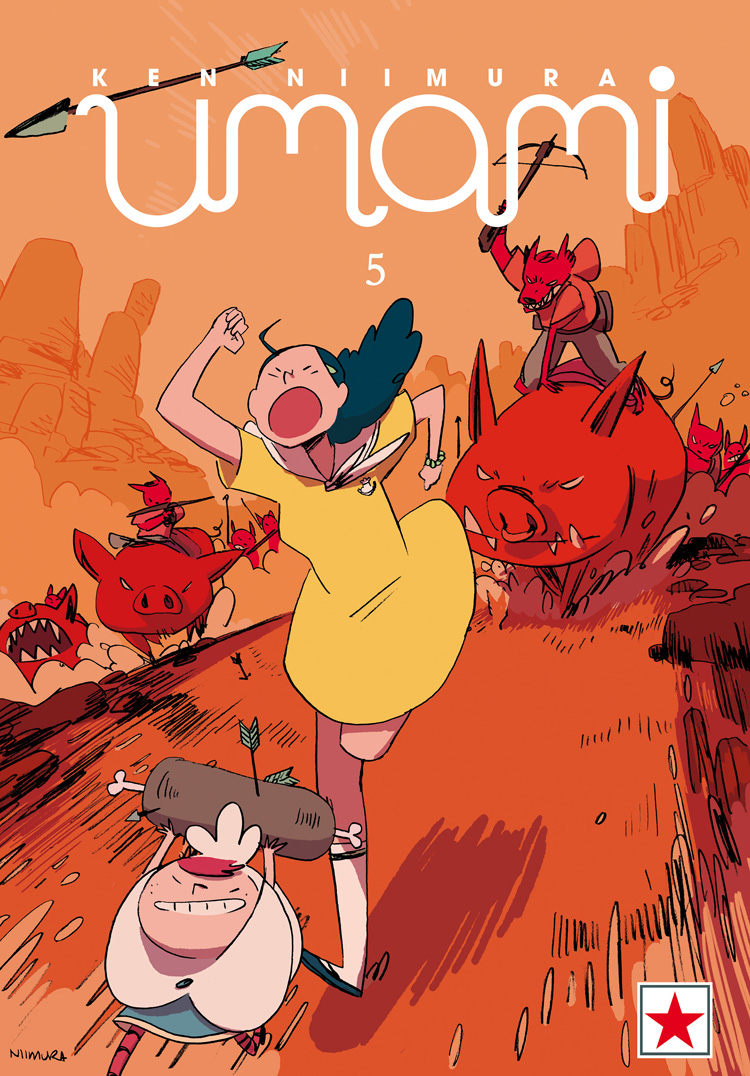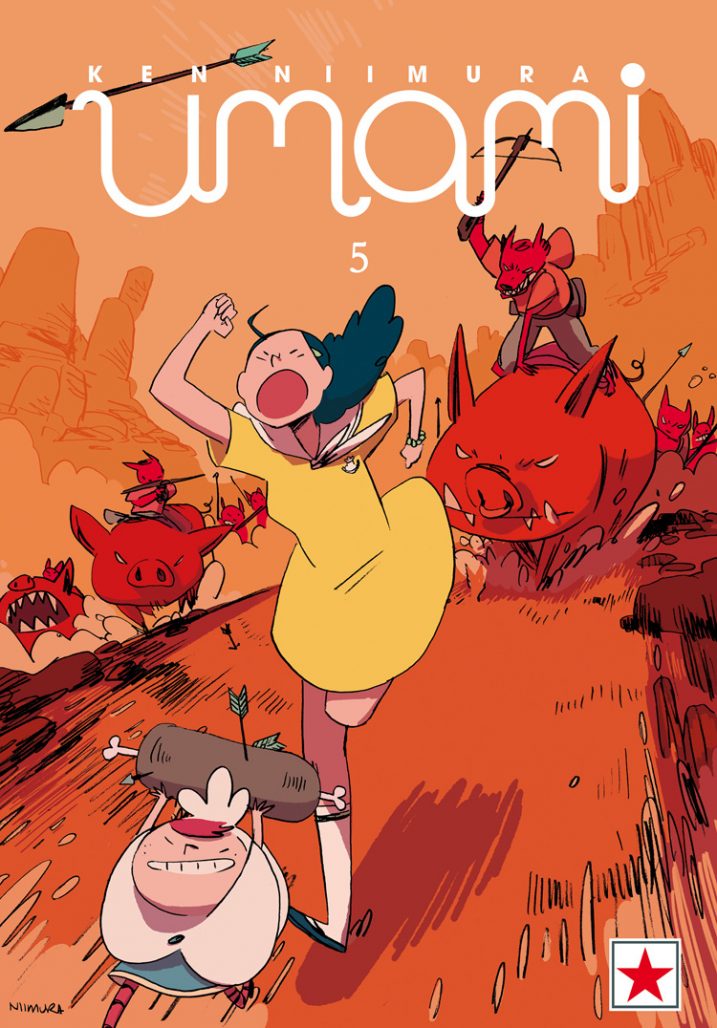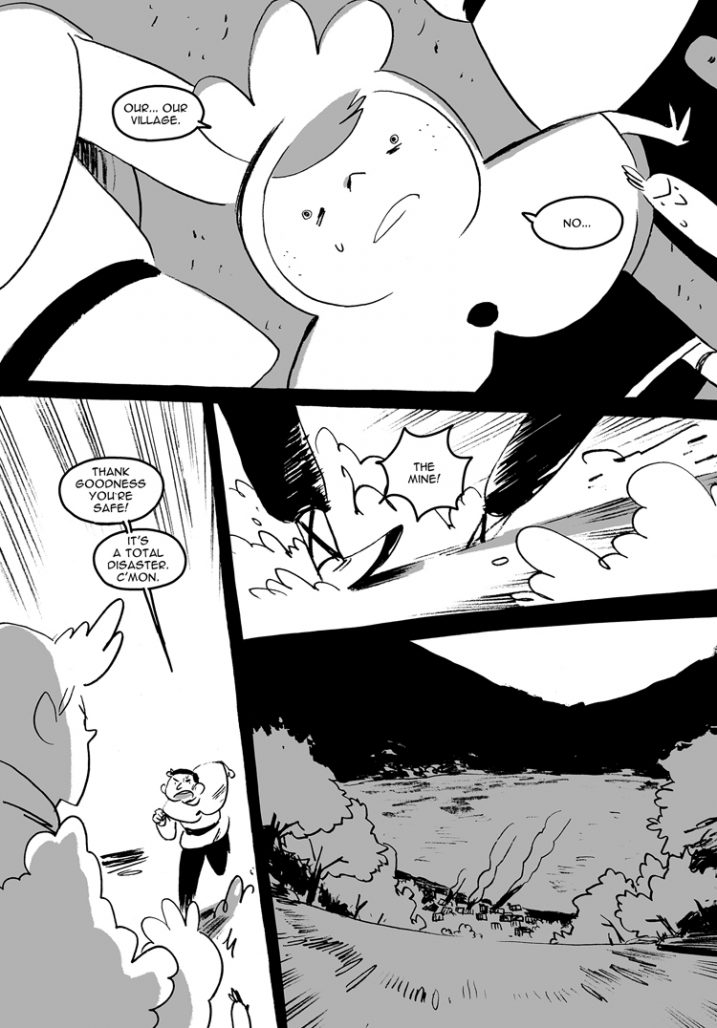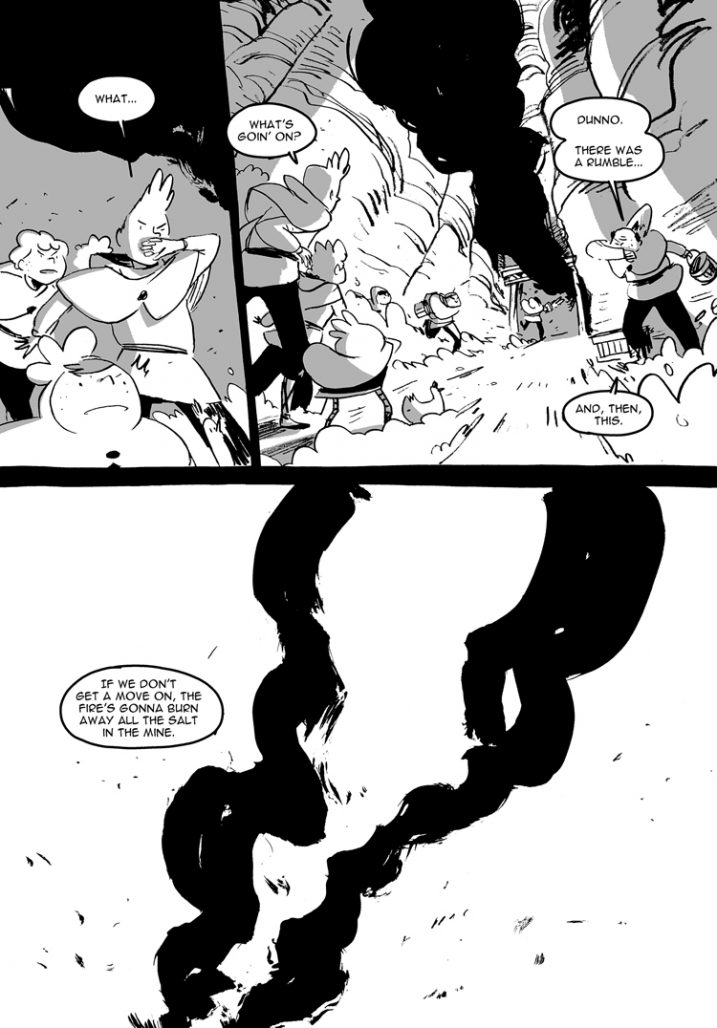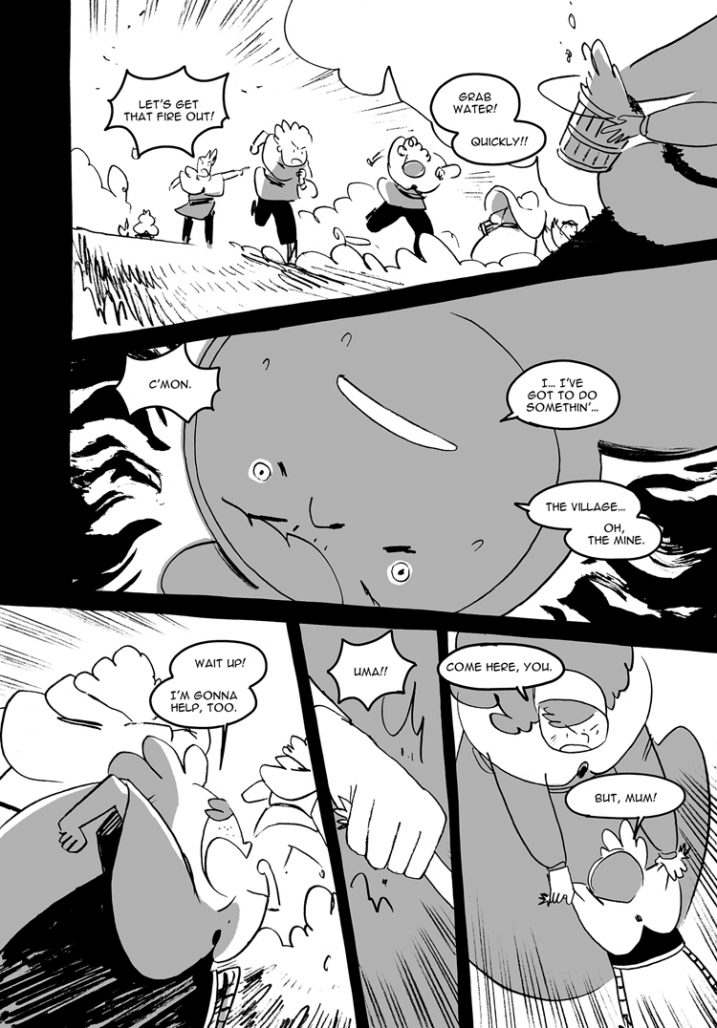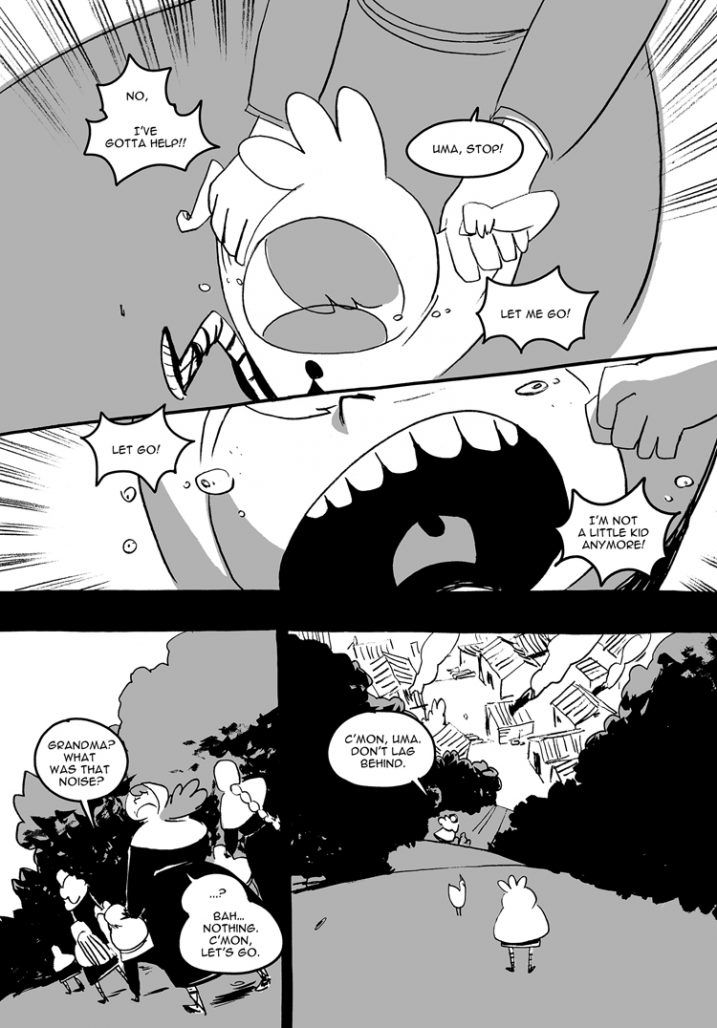The latest comics tale to make it to the big screen is Ken Niimura and Joe Kelly’s I Kill Giants. Currently sitting at 91% on Rotten Tomatoes, the 2009 comic book about a young girl escaping the problems of real life in a fantasy world where she fights evil giants has a chance to put a spotlight on one of the medium’s true gems and its creators. Artist, Ken Niimura currently has a new phenomenal ongoing series through the creator first digital-only Panel Syndicate that’s a departure into food, fantasy, and friendship.
Umami is a book for everyone who eats and that’s all of us. It’s the story of two unlikely culinary allies. Uma, a militantly positive young girl with a vault of unorthodox cooking knowledge and Ami, the proper perfectionist chef on a quest to become the future personal cook to a king. Their adventures of traversing dangerous lands and surviving hazards like being the main course to cave dwelling beasts are only part of the charm of this book. The love/hate relationship of Ami and Uma is fun to watch unfold with a personality to these pages that’s unmatched in comics.
We got a chance to talk to Ken Niimura about his visual storytelling in Umami and his thoughts on seeing his I Kill Giants translated to film.
COMICS BEAT: Before we get into Umami, I wanted to ask about your thoughts on the release of I Kill Giants in theaters. If you’ve seen the final product, what are your thoughts on how the film translated the art style of the book?
Ken Niimura: I was lucky enough to be able to watch it at the premiere at the Toronto Film Festival, and although I had been to see the film being shot in Dublin, it was the first time (actually for everyone except the director) to see it finished. And it was at the cinema that I finally realized we were actually having a movie made from our comic!
The cast and staff have all done an incredible job, and Anders’ vision keeps Joe’s story intact while adding so many new layers and nuances.
If I were to put it in a category, I’d say it’s a fantasy movie with a dark twist, that adults and kids can enjoy. There used to be more of these kinds of movies in the 80’s, but they’re lately so rare that you really need to go watch it if you are into them!
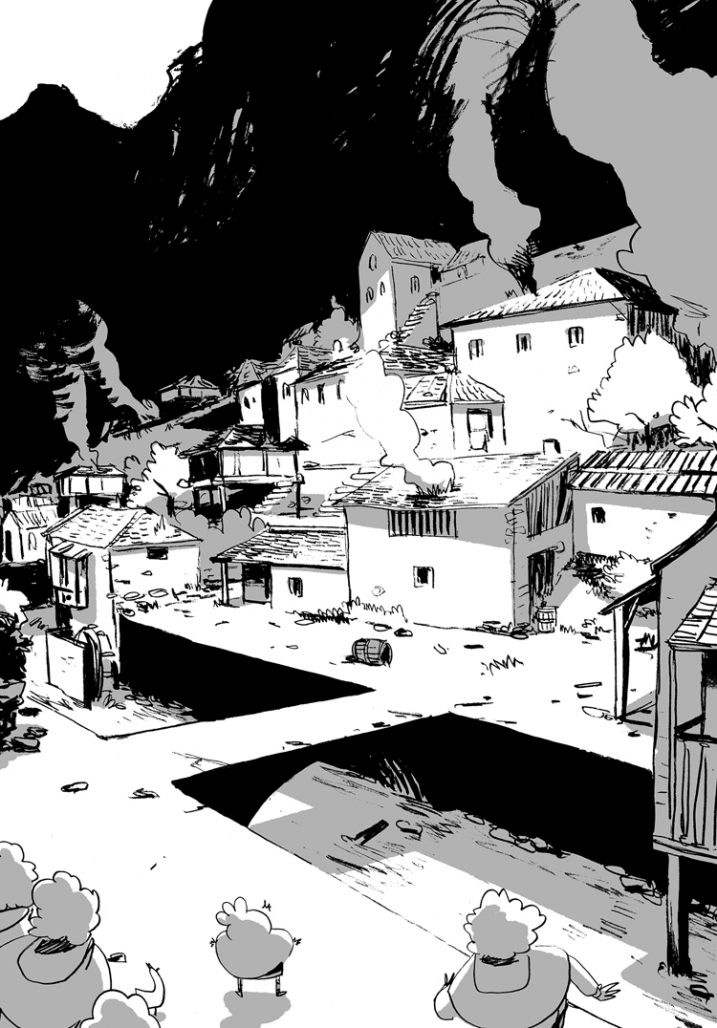
CB: I love the humor and inventive uses of food in this series. Umami feels very in touch with how personal your work feels to the audience. How did you come up with the idea for the story of these two perfect strangers?
Niimura: I’ve been an RPG gamer and high-fantasy geek forever, but have always had a hard time identifying with the kind of characters that are chosen as the main cast (the warrior, the elf, the mage…), so I wanted to make a high-fantasy story that’d talk about all of “the others.” And there’s no one less heroic than cooks, who in these stories are mostly there to feed the heroes. What if a cook could become a hero?
I also love food and cooking comics, but wanted to try to write one that didn’t feature either a recipe book approach or the gourmet approach – couldn’t there be a different way of thinking about cooking? Is it necessary to always follow the recipe? And since we’re told since we’re kids that we can’t play with food – was there a way to play with food while being respectful of cooking?
These 2 separate ideas were the beginning of “Umami” – which is in a way the anti-high-fantasy, anti-cooking comic!
CB: How did the book come to be on Panel Syndicate?
Niimura: I’ve been intrigued by Panel Syndicate’s format since it came out, and had the chance to talk to Marcos Martín through an introduction from fellow Panel Syndicate artist David Lopez.
The idea is that they provide the platform, but all the rest is up to the author – what to publish, when, and how. On top of that, each release also gives exposure to the existing projects, so it’s a model that’s as simple and direct as you can get.
The other factor was, honestly, that you don’t always have the chance to publish alongside works such as “Private Eye,” “Universe!” or “Black Hand Iron Head.”
CB: Typically, the books available through the digital, creator-to-audience, site are designed in a widescreen format. What made you go with a traditional horizontal comic book page format for this digital-first series?
Niimura: Panel Syndicate and other webcomics are made horizontally expecting they will be read on a computer or a tablet, but in my opinion, lately we do most of all of that reading on our smartphones. We wanted to try to make a comic that reads just as well in big and small formats, and that you can read scrolling down vertically — and the result is actually very similar to that of a manga page (black and white, vertical). I’ve worked on all of the storytelling, pacing, and art trying to make the best reading experience possible.
Time will tell if this idea makes sense, but everyone at Panel Syndicate was very supportive of the idea, and willing to try a new approach.
CB: Your work has a simplicity to it, yet it conveys high levels of emotion. What is it about your process and your training as an artist that turns simple line drawings into necessary parts of a story?
Niimura: It’s all about guiding the eye through the page and panels, and giving the necessary information at each time. My pencils are actually a real mess of lines, as I want to make sure all the information is where it should be, and I only simplify the drawing when I ink.
The idea is not that much that you stay to contemplate a specific panel, but that you fly from one to the next. Comics are what happens in your head, never on the paper, and making comics taking this into account is a fun, but complex process.
CB: Those of us reading the book are getting a glimpse at your own dieting as well as artistic process. Is Umami going to be complete once you’ve finished your fitness goals?
Niimura: Please be reassured – I’m probably never going to get the massive muscles as I’d like to — which means we’ll probably read “Umami” for a long time still!
CB: I don’t know if it helps or hurts your cause when you craft comic books about using bread. But it is good to know we’ll see more of this fantastic food fight.
Check out Umami on Panel Syndicate where every title is distributed on a “name your price” model. It’s an incredible platform for storytellers looking to get weird and wonderful comics to audiences direct. Umami issue #5 is on the site now along with catching up on issues 1-4.


